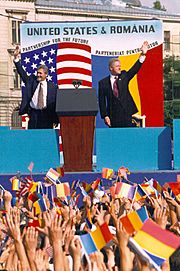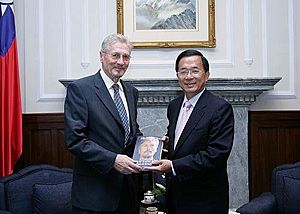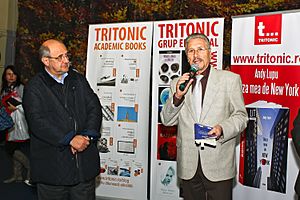Emil Constantinescu facts for kids
Quick facts for kids
Emil Constantinescu
|
|
|---|---|
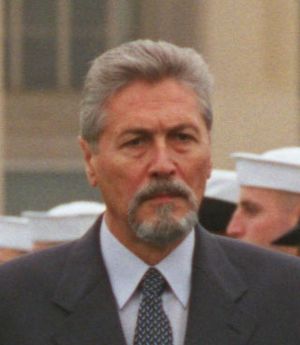
Constantinescu in 1998
|
|
| 2nd President of Romania | |
| In office 29 November 1996 – 20 December 2000 |
|
| Prime Minister | Nicolae Văcăroiu
|
| Preceded by | Ion Iliescu |
| Succeeded by | Ion Iliescu |
| Leader of the Romanian Democratic Convention | |
| In office November 1992 – 29 November 1996 |
|
| Preceded by | Corneliu Coposu |
| Personal details | |
| Born | 19 November 1939 Tighina, Ținutul Nistru, Kingdom of Romania (present day de jure Tighina, Republic of Moldova, de facto Bender, Transnistria) |
| Political party | National Liberal Party (2008–present) |
| Other political affiliations |
Romanian Communist Party (1965–1989) Christian Democratic National Peasants' Party (1990–1996) Independent (1996–2000; PNȚ-CD membership suspended while president) People's Action (2001–2008) |
| Spouse | Nadia Ileana Constantinescu |
| Children | Dragoș Norina Boru |
| Profession | Professor of Geology |
| Religion | Eastern Orthodox |
| Signature | |
Emil Constantinescu (born on November 19, 1939) is a Romanian professor and politician. He served as the President of Romania from 1996 to 2000.
After the Romanian Revolution of 1989, Mr. Constantinescu helped start the Civic Alliance. This was an important group working for democracy. He also led the Democratic Romanian Anti-Totalitarian Forum. This group later became the Romanian Democratic Convention (CDR), a political alliance. He also led the People's Action party. This party later joined the National Liberal Party in 2008. Today, he is still involved in Romanian politics, but not as much as before.
Contents
Early Life and Education
Emil Constantinescu was born on November 19, 1939. His birthplace was Tighina, which is now called Bender. This area is currently part of Transnistria. His mother, Maria Georgeta Colceag, was a music student. She gave up her music career to support her husband, Ion Constantinescu. His father was an agricultural engineer.
In 1943, his family moved to Brădetu village in Argeș County. Emil spent his childhood there. He had a sister, Marina, born in 1942, and a brother, Cristian, born in 1946.
From 1953 to 1956, Emil Constantinescu attended "Nicolae Bălcescu" High School. He then studied law at the University of Bucharest. He earned his law degree in 1960. After a military internship, he worked as a judge. However, he decided to change his career path.
From 1961 to 1966, he studied Geology and Geography. He earned a PhD in Geology from the University of Bucharest. He also received a Doctor of Sciences degree from Duke University in the US. In 1963, he married Nadia Ileana, who was also a lawyer.
Professional Career
Emil Constantinescu taught at the Faculty of Geology from 1966 to 1990. Since 1991, he has been a professor of Mineralogy at the University of Bucharest. He was also a visiting professor at Duke University in the United States.
He served as vice-rector (1990–1992) and rector (1992–1996) of the University of Bucharest. He also led the National Council of Rectors from Romania. He was a member of important international university groups.
He has written 12 books and over 60 scientific studies. These works are about geology. They have been published in well-known scientific journals. He is an honorary member of many geological and mineralogical societies. These include societies in the United Kingdom, Germany, the US, and Japan. He is also a member of the National Geographic Society.
He has given lectures at many universities around the world. These include Oxford, Stanford, and Harvard. He has received several awards for his scientific work. One notable award is the Romanian Academy Award for geology.
Political Journey (1990–1996)
After the end of the communist rule in Romania, Emil Constantinescu became involved in politics. He worked with other professors and thinkers. Their goal was to bring democracy back to Romania. They wanted to protect human rights and freedoms.
He was one of the people who protested against the government in 1990. This protest lasted 42 days in Bucharest's University Square. After violence by miners in June 1990, he helped create Solidaritatea Universitară (Academic Solidarity).
He also helped found the Civic Alliance in 1990. This was a major non-governmental organization. These groups joined with other democratic parties. Together, they formed the Romanian Democratic Convention (CDR) in 1991.
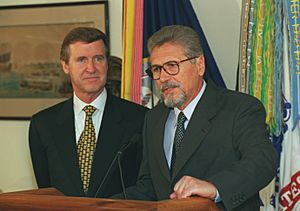
In 1992, the CDR chose Emil Constantinescu as their candidate for president. He made it to the second round of elections. He received 38% of the votes. He ran against the current president, Ion Iliescu. After this, the CDR chose him again as their presidential candidate for the 1996 elections. He worked to make the democratic opposition stronger during this time.
Presidency (1996–2000)
In 1996, Emil Constantinescu ran for president again. This time, he won against Ion Iliescu. He won by about 10% of the votes. This election was important. It was the first time power changed peacefully in Romania after 1989. When he became president, he stopped being a member of his political party. This is because the Constitution says a president cannot be a formal party member.
During his four years as president, he faced challenges. The process of selling state-owned businesses (privatization) was slow. This led to more unemployment and poverty for a while. There were also more "Mineriads" in 1999. These were protests by miners. After these events, there was a political crisis among the ruling parties. A severe drought in 2000 also hurt the country. At the end of his term in 2000, he decided not to run again. He said that the political system had been too difficult to change.
One of his last actions as president was to pardon Ion Coman. Coman had led the crackdown during the 1989 revolution in Timișoara.
After the Presidency (2000–Present)
Emil Constantinescu's time as president faced economic difficulties. However, his presidency is remembered for ending the "Mineriads." He also helped reform the banking system. And he attracted the first major foreign investments to Romania after 1989.
Many Romanians were disappointed that daily life did not improve quickly. This led to a loss of trust in major parties. In July 2000, Emil Constantinescu announced he would not seek a second term. He stepped away from politics for a while in November 2000.
However, Romania continued its foreign policy goals. These goals included joining NATO in 2004. Romania also joined the European Union (EU) in 2007.
The former president returned to politics in 2002. He led the People's Action party. This party later joined the National Liberal Party in 2008.
Mr. Constantinescu has sometimes criticized other politicians. He remains very active today. He works with many non-governmental organizations (NGOs). These organizations are both in Romania and around the world. He is the president of the Association of Citizenship Education. He also leads the Romanian Foundation for Democracy. He is the founding president of the Institute for Regional Cooperation and Conflict Prevention (INCOR).
He often speaks at the Oslo Freedom Forum. In 2010, he gave them a presidential medal. He is also part of the advisory council for the Victims of Communism Memorial Foundation. In 2023, he spoke about Romanian lawmakers. He said they needed a better long-term plan for the country.
Honours and Awards
Emil Constantinescu has received many awards and honors.
National Honours
 Romania:
Romania:
- Order of the Star of Romania, 1st Class
- The Romanian Army's Badge of Honor (2012)
Foreign Honours
 Austria: Grand Star of the Decoration of Honour for Services to the Republic of Austria (1999)
Austria: Grand Star of the Decoration of Honour for Services to the Republic of Austria (1999) Croatia: Recipient of the Grand Order of King Tomislav (2000)
Croatia: Recipient of the Grand Order of King Tomislav (2000) Denmark: Knight of the Order of the Elephant (2000)
Denmark: Knight of the Order of the Elephant (2000) Finland: Grand Cross with Collar of the Order of the White Rose of Finland (1998)
Finland: Grand Cross with Collar of the Order of the White Rose of Finland (1998) Peru: Grand Cross with Diamonds of the Order of the Sun of Peru (1998)
Peru: Grand Cross with Diamonds of the Order of the Sun of Peru (1998) Norway: Grand Cross of the Order of St. Olav (1999)
Norway: Grand Cross of the Order of St. Olav (1999) Portugal: Grand Collar of the Order of Prince Henry (2000)
Portugal: Grand Collar of the Order of Prince Henry (2000) Slovakia: Grand Cross of the Order of the White Double Cross (2000)
Slovakia: Grand Cross of the Order of the White Double Cross (2000) Turkey: Order of the State of Republic of Turkey (1999)
Turkey: Order of the State of Republic of Turkey (1999) Ukraine: First Class of the Order of Prince Yaroslav the Wise (2000)
Ukraine: First Class of the Order of Prince Yaroslav the Wise (2000) United Kingdom: Honorary Knight Grand Cross of the Order of St Michael and St George (2000)
United Kingdom: Honorary Knight Grand Cross of the Order of St Michael and St George (2000)
Electoral History
Presidential Elections
| Election | Affiliation | First round | Second round | ||||
|---|---|---|---|---|---|---|---|
| Votes | Percentage | Position | Votes | Percentage | Position | ||
| 1992 | CDR | 3,717,006 |
31.1%
|
2nd | 4,641,207 |
38.6%
|
2nd |
| 1996 | CDR | 3,569,941 |
28.2%
|
2nd | 7,057,906 |
54.4%
|
1st |
See also
 In Spanish: Emil Constantinescu para niños
In Spanish: Emil Constantinescu para niños
 | Bessie Coleman |
 | Spann Watson |
 | Jill E. Brown |
 | Sherman W. White |


